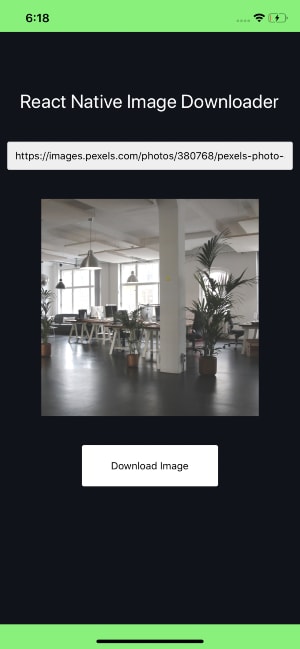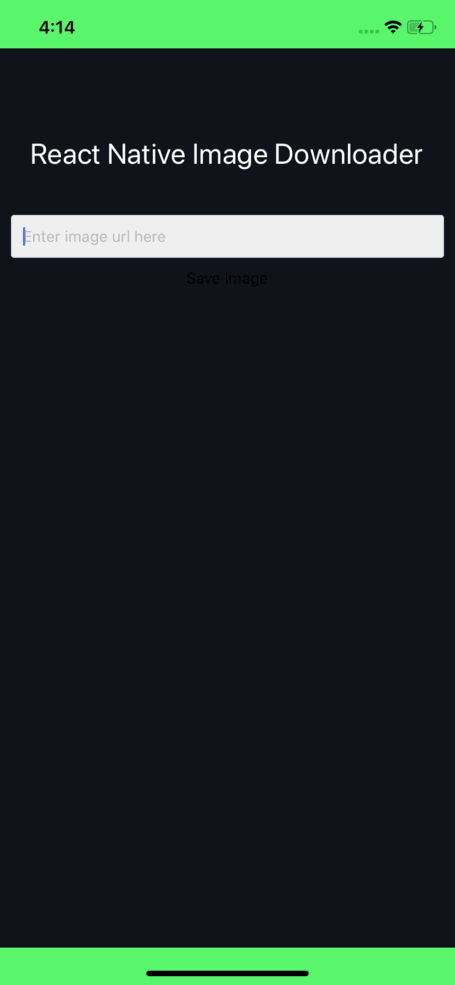Easy Way to Insatntly Get the Urls of Taken Photos Reactnative

In this article, I will evidence you lot how to save an image from a remote url to your device using react-native.
TL/DR Find the full lawmaking in this github repo
I'm assuming you already accept node and react-native set up up, if you don't, delight check out the official docs to acquire how to gear up a react native projection.
The post-obit packages are required for this tutorial
- @react-native-community/cameraroll
- rn-fetch-blob
Installing the packages
Install the packages using yarn
yarn add together @react-native-community/cameraroll rn-fetch-blob
or npm
npm install @react-native-customs/cameraroll rn-fetch-blob --salvage
Link the native code
if your react-native version >= 0.sixty, autolink using
cd ios && pod install
else link manually with
react-native link @react-native-community/cameraroll react-native link rn-fetch-blob
With this, we are done installing the required packages. Navigate to app.js
project_dir -> app.js
delete the default react native code and replace it with this block
// app.js import React from ' react ' ; import { SafeAreaView , StyleSheet , StatusBar , Text } from ' react-native ' ; course App extends React . Component { render () { render ( <> < StatusBar barStyle = " dark-content " /> < SafeAreaView style = { styles . container } > < Text > Save Prototype < /Text > < /SafeAreaView > < / > ); } } export default App ; const styles = StyleSheet . create ({ container : { backgroundColor : ' #2FF345CC ' , flex : 1 , justifyContent : ' middle ' , alignItems : ' eye ' , }, });
Run the app in the simulator with
react-native run-ios # or react-native run-android
You should see something like this

Setting upward permissions
The user's permission is required for cameraroll to save images to their device. On ios, NSPhotoLibraryUsageDescription and NSPhotoLibraryAddUsageDescription keys must be gear up in info.plist with a cord that describes how your app will use this information. Navigate to info.plist
project_dir -> ios -> project_name -> info.plist
add the following block to info.plist
<!-- info.plist --> <?xml version="one.0" encoding="UTF-8"?> <!DOCTYPE plist PUBLIC "-//Apple//DTD PLIST 1.0//EN" "http://www.apple.com/DTDs/PropertyList-1.0.dtd"> <plist version= "1.0" > <dict> ... <fundamental>NSPhotoLibraryAddUsageDescription</key> <string>This app would like to salvage images to your device.</string> <key>NSPhotoLibraryUsageDescription</key> <string>This app would like to save images to your device.</string> ... </dict> </plist>
Acquit in mind that the clarification cord must be a chip more than descriptive than this.
On android, permission is required to write to external storage. Permission can be requested past calculation the following block to AndroidManifest.xml
# navigate to AndroidManifest.xml project_dir -> android -> app -> src -> main -> AndroidManifest.xml
<!-- AndroidManifest.xml --> <manifest xmlns:android= "http://schemas.android.com/apk/res/android" package= "com.saveremoteimage" > ... <uses-permission android:proper name= "android.permission.WRITE_EXTERNAL_STORAGE" /> ... </manifest>
Implementation
This is an image of what the end product would look like

Allow's build the UI. Kickoff, start by creating a view that would contain all our components
// app.js ... import { SafeAreaView , StyleSheet , StatusBar , Text , View } from ' react-native ' ; class App extends React . Component { return () { return ( <> < StatusBar barStyle = " dark-content " /> < SafeAreaView style = { styles . container } > < View fashion = { styles . app } > < Text > Save Paradigm < /Text > < /View > < /SafeAreaView > < / > ); } } ... const styles = StyleSheet . create ({ ... app : { backgroundColor : ' #11131B ' , flex : ane , alignSelf : ' stretch ' , alignItems : ' heart ' , paddingVertical : xxx , }, });
Then we add a TextInput. This TextInput is where the url of the prototype would exist entered
// app.js ... import { ... TextInput , } from ' react-native ' ; grade App extends React . Component { return () { render ( <> ... < View style = { styles . app } > < Text style = { styles . headerText } > React Native Image Downloader < /Text > < View style = { styles . textInputWrapper } > < TextInput placeholder = " Enter prototype url hither " style = { styles . textInput } / > < /View > < Text > Save Epitome < /Text > < /View > ... < / > ); } } ... const styles = StyleSheet . create ({ ... headerText : { marginTop : 50 , fontSize : 26 , colour : ' white ' , }, textInputWrapper : { marginTop : 30 , alignSelf : ' stretch ' , padding : 10 , }, textInput : { padding : ten , backgroundColor : ' #EFEFEF ' , borderWidth : 1 , borderColor : ' #DDD ' , borderRadius : 3 , }, });
At this point, your app should look like this

At present, allow's create a view that would contain a preview of the epitome to be downloaded
// app.js ... class App extends React . Component { render () { return ( <> ... < View style = { styles . app } > ... < View way = { styles . imagePreview } / > < Text > Save Epitome < /Text > < /View > ... < / > ); } } ... const styles = StyleSheet . create ({ ... imagePreview : { height : 300 , width : 300 , backgroundColor : ' purple ' , marginTop : thirty , }, });
Finally, let's add together a button nosotros can employ to initiate the download.
// app.js ... import { ... TouchableOpacity , } from ' react-native ' ; class App extends React . Component { render () { return ( <> ... < View style = { styles . app } > ... < View style = { styles . imagePreview } / > < TouchableOpacity style = { styles . downloadButton } > < Text > Download Image < /Text > < /TouchableOpacity > < /View > ... < / > ); } } ... const styles = StyleSheet . create ({ ... downloadButton : { backgroundColor : ' white ' , marginTop : 40 , paddingHorizontal : 40 , paddingVertical : 20 , borderRadius : iii , }, });
At the this point, your app should look similar this

At present nosotros bind the value of the TextInput to state and so information technology is accessible elsewhere.
... class App extends React . Component { state = { url : '' , }; updateUrl = url => { this . setState ({ url }); }; render () { const { url } = this . state ; return ( <> < StatusBar barStyle = " dark-content " /> < SafeAreaView style = { styles . container } > < View style = { styles . app } > ... < View style = { styles . textInputWrapper } > < TextInput placeholder = " Enter image url here " style = { styles . textInput } value = { url } onChangeText = { text => this . updateUrl ( text )} / > < /View > ... < /SafeAreaView > < / > ); } } export default App ; ...
Next, we'll bind the url in state to an prototype componenent so it can be displayed.
import React from ' react ' ; import { ... Prototype , } from ' react-native ' ; class App extends React . Component { ... return () { .. return ( <> < StatusBar barStyle = " dark-content " /> < SafeAreaView style = { styles . container } > < View manner = { styles . app } > < Text style = { styles . headerText } > React Native Image Downloader < /Text > < View mode = { styles . textInputWrapper } > ... < /View > { /* nosotros've replaced the View with an Image*/ } < Prototype source = {{ uri : url }} manner = { styles . imagePreview } / > < TouchableOpacity style = { styles . downloadButton } > < Text > Download Epitome < /Text > < /TouchableOpacity > < /View > < /SafeAreaView > < / > ); } } ...

Adding download functionality
Allow'southward create a handleDownload part and attach information technology to our TouchableOpacity
import React from ' react ' ; import { ... } from ' react-native ' ; import CameraRoll from ' @react-native-customs/cameraroll ' ; import RNFetchBlob from ' rn-fetch-blob ' ; grade App extends React . Component { ... handleDownload = async () => { RNFetchBlob . config ({ fileCache : true , appendExt : ' png ' , }) . fetch ( ' GET ' , this . state . url ) . then ( res => { CameraRoll . saveToCameraRoll ( res . data , ' photo ' ) . so ( res => console . log ( res )) . catch ( err => console . log ( err )) }) . take hold of ( mistake => console . log ( error ); }; return () { ... return ( <> < StatusBar barStyle = " dark-content " /> < SafeAreaView style = { styles . container } > ... < TouchableOpacity style = { styles . downloadButton } onPress = { this . handleDownload } > < Text > Download Image < /Text > < /TouchableOpacity> ... < /SafeAreaView > < / > ); } } ...
For android devices you need to ensure y'all have permission to relieve images.
import React from ' react ' ; import { ... PermissionsAndroid , Alert , } from ' react-native ' ; import CameraRoll from ' @react-native-customs/cameraroll ' ; import RNFetchBlob from ' rn-fetch-blob ' ; grade App extends React . Component { ... getPermissionAndroid = async () => { try { const granted = await PermissionsAndroid . asking ( PermissionsAndroid . PERMISSIONS . WRITE_EXTERNAL_STORAGE , { title : ' Image Download Permission ' , message : ' Your permission is required to save images to your device ' , buttonNegative : ' Cancel ' , buttonPositive : ' OK ' , }, ); if ( granted === PermissionsAndroid . RESULTS . GRANTED ) { return truthful ; } Alert . alert ( ' Relieve remote Image ' , ' Grant Me Permission to save Image ' , [{ text : ' OK ' , onPress : () => panel . log ( ' OK Pressed ' )}], { cancelable : false }, ); } catch ( err ) { Alert . alert ( ' Salvage remote Epitome ' , ' Failed to save Image: ' + err . message , [{ text : ' OK ' , onPress : () => console . log ( ' OK Pressed ' )}], { cancelable : fake }, ); } }; handleDownload = async () => { // if device is android you lot have to ensure yous have permission if ( Platform . OS === ' android ' ) { const granted = await this . getPermissionAndroid (); if ( ! granted ) { return ; } } RNFetchBlob . config ({ fileCache : true , appendExt : ' png ' , }) . fetch ( ' GET ' , this . state . url ) . so ( res => { ... }; render () { ... } } ...
Finally lets add an ActivityIndicator and some helpful feedback messages. Your final lawmaking should look like this:
Here'due south a niggling video demo.
Source: https://dev.to/majiyd/react-native-series-how-to-save-an-image-from-a-remote-url-in-react-native-109d
0 Response to "Easy Way to Insatntly Get the Urls of Taken Photos Reactnative"
Post a Comment